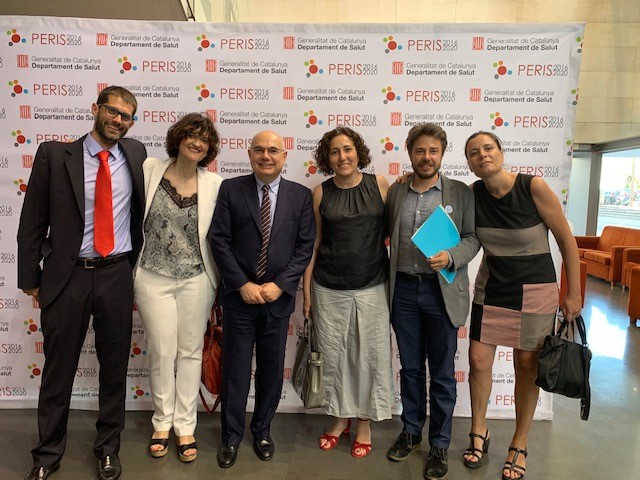
Celebrated last week, the third edition of the Catalonian Department of Health’s Strategic Plan for Research and Innovation in Health (Pla Estratègic de Recerca i Innovació en Salut, PERIS), announced 66 award recipients, counting several VHIO led proposals that have received over 550,000 EUR of PERIS’ ‘global’ funding amounting to 8 million for this particular round.
This year’s PERIS received 207 proposals which were assessed by around thirty independent experts under the coordination of the Health Evaluation and Quality Agency of Catalonia (Agència de Qualitat i Avaluació Sanitàries de Catalunya, AQuAS). The selected proposals, recognized for their promise to yet further strengthen research throughout the region, are set to deliver on PERIS’ ambitions of promoting health and wellbeing among Catalonia’s citizens, increase international competitiveness to reaffirm the community as a leading hub of research and innovation of excellence, as well as further establish health as a key driver of social and economic development.
VHIO picked up recognitions in each of the three defined categories, namely, professional development, the incorporation of new research talents and technicians in existing groups, and support to drive and engage in international scientific activities.
The more effective, less invasive monitoring of colon cancer
Elena Élez, Medical Oncologist and Clinical Investigator of our Gastrointestinal & Endocrine Tumors Group (PI: Teresa Macarulla), received over 165,000 EUR to build on VHIO successes marked to-date in validating, developing and applying liquid biopsy to more precisely ‘police’ cancer over time, in real time, as well as better steer treatment decisions.
More specifically, PERIS funding will facilitate the recruitment of an additional group member which will enable Elena to dedicate the necessary time and expertise to implement and lead a project for detecting relapse in advanced colon cancer patients by longitudinally following a personalized molecular signature liquid biopsy.
Commenting for VHIO Communications Elena Élez said, “It is thanks to this precious funding that I will be able to continue to evaluate the clinical feasibility of tracking tumor progression by dynamically detecting a molecular signature from a blood test. As a promising approach for the early detection of disease, our research will drive insights into how we can more accurately monitor cancer’s next moves.”
She continued, “We will seek to establish the prognostic and predictive value of analyzing circulating tumor DNA considering other tumor characteristics which are already used in routine clinical practice to guide therapies tailored to the specificities of individual patients.”
Her research will also focus on analyzing the respective yield of each qualitative and quantitative circulating free DNA (cfDNA) parameter, delving deeper into the clonal evolution of cancer drivers under standard care and surveillance, and comparing data with biomarkers and conventional imaging.
“Cancer relapse and metastatic cell spread are the major culprits of cancer mortality. While collective research efforts have undoubtedly led to important advances in the treatment of colon cancer, we still have far to travel to improve both the prognosis and outcomes of these patients,” concluded Elena.
Go Europe: promoting international R&D&I
One novel addition to this year’s PERIS call are the Go Europe grants to fuel international projects of excellence. This funding awards research support units of accredited research institutes and centers belonging to the CERCA Institute in order to extend their global reach, increase participation in international projects -EU’s Horizon 2020 Research and Innovation programme in particular- as well as improve their success rate and returns achieved through competitive grants.
Totaling at almost €300,000, VHIO’s Go Europe will strengthen our international grant application processes and consolidate our European Projects Office directed by Alejandro Piris, Head of VHIO’s Scientific Coordination Area.
“Our projects and scientific coordination teams are devoted to offering a range of personalized and professional support services to all VHIO groups, including identifying projects and helping to prepare proposals – all of which enable our researchers to file successful applications. The European Projects Office will work on prioritising and consolidating collaborative networks with cancer research centres in and outside of the EU,” observed Alejandro Piris.
Since it was established back in 2010, VHIO’s Scientific Coordination Area has evolved from an office providing basic support to a highly professional team with experience in both cancer research and project management.
“This support will enable us to centralize all identified proposals and projects presented by VHIO researchers and management teams, match them to existing and future calls across various funding sources, and tailor them to the requirements of the respective calls,” added Alejandro.
The Office will continue to identify key opportunities, requirements and elements that should be taken into account, establish project deadlines, lead and coordinate proposal writing, and devise and implement contingency plans.
Bringing additional talents to existing research groups
Regarding the incorporation of new research faculty and technicians in existing groups, Cristina Saura, Joaquin Mateo, and César Serrano, PIs of our Breast Cancer & Melanoma, Prostate Cancer Translational Research, and Sarcoma Translational Research Groups, respectively, have also received funding to incorporate new talents within their teams.
Concerning Joaquin Mateo’s Group, Irene Casanova will join VHIO to help develop liquid biopsy using tumor DNA from isolated blood vessels, which will help the team to study the evolution of the cancer genome, as well as response and resistance to targeted therapies against prostate cancer.
###








